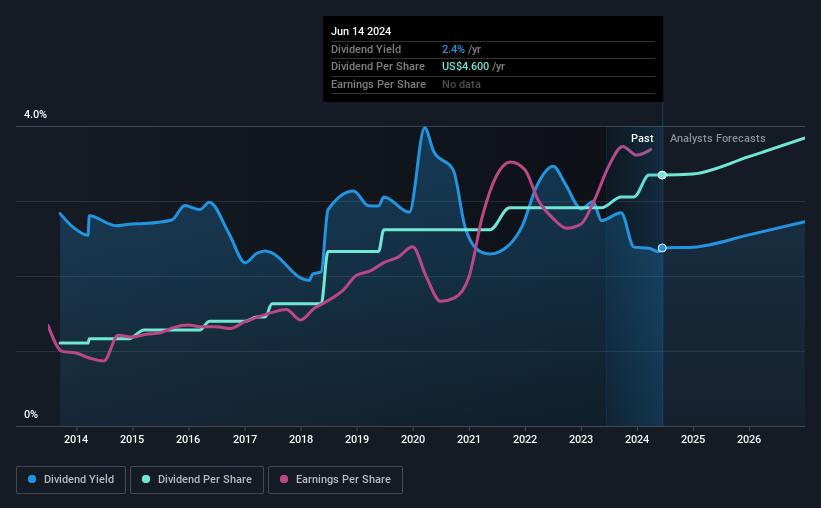JPMorgan Chase (NYSE:JPM) Will Pay A Dividend Of $1.15
JPMorgan Chase & Co. (NYSE:JPM) has announced that it will pay a dividend of $1.15 per share on the 31st of July. Despite this raise, the dividend yield of 2.4% is only a modest boost to shareholder returns.
See our latest analysis for JPMorgan Chase
JPMorgan Chase's Dividend Forecasted To Be Well Covered By Earnings
Even a low dividend yield can be attractive if it is sustained for years on end.
JPMorgan Chase has established itself as a dividend paying company with over 10 years history of distributing earnings to shareholders. Based on JPMorgan Chase's last earnings report, the payout ratio is at a decent 26%, meaning that the company is able to pay out its dividend with a bit of room to spare.
The next 3 years are set to see EPS grow by 4.9%. The future payout ratio could be 30% over that time period, according to analyst estimates, which is a good look for the future of the dividend.
JPMorgan Chase Has A Solid Track Record
Even over a long history of paying dividends, the company's distributions have been remarkably stable. Since 2014, the dividend has gone from $1.52 total annually to $4.60. This works out to be a compound annual growth rate (CAGR) of approximately 12% a year over that time. We can see that payments have shown some very nice upward momentum without faltering, which provides some reassurance that future payments will also be reliable.
The Dividend Looks Likely To Grow
Investors could be attracted to the stock based on the quality of its payment history. JPMorgan Chase has impressed us by growing EPS at 13% per year over the past five years. Growth in EPS bodes well for the dividend, as does the low payout ratio that the company is currently reporting.
We Really Like JPMorgan Chase's Dividend
In summary, it is always positive to see the dividend being increased, and we are particularly pleased with its overall sustainability. Distributions are quite easily covered by earnings, which are also being converted to cash flows. All in all, this checks a lot of the boxes we look for when choosing an income stock.
Market movements attest to how highly valued a consistent dividend policy is compared to one which is more unpredictable. Still, investors need to consider a host of other factors, apart from dividend payments, when analysing a company. For example, we've identified 2 warning signs for JPMorgan Chase (1 makes us a bit uncomfortable!) that you should be aware of before investing. If you are a dividend investor, you might also want to look at our curated list of high yield dividend stocks.
Have feedback on this article? Concerned about the content? Get in touch with us directly. Alternatively, email editorial-team (at) simplywallst.com.
This article by Simply Wall St is general in nature. We provide commentary based on historical data and analyst forecasts only using an unbiased methodology and our articles are not intended to be financial advice. It does not constitute a recommendation to buy or sell any stock, and does not take account of your objectives, or your financial situation. We aim to bring you long-term focused analysis driven by fundamental data. Note that our analysis may not factor in the latest price-sensitive company announcements or qualitative material. Simply Wall St has no position in any stocks mentioned.
Have feedback on this article? Concerned about the content? Get in touch with us directly. Alternatively, email editorial-team@simplywallst.com

 Yahoo Finance
Yahoo Finance 
